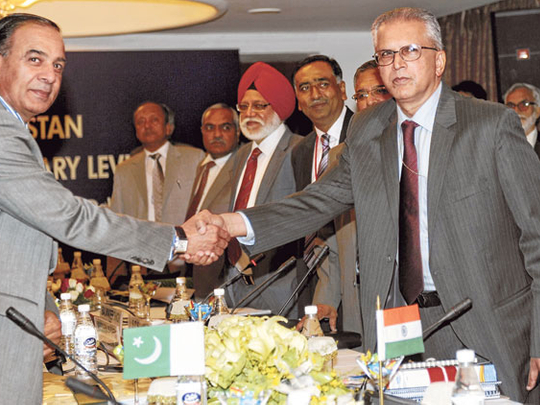
It is easy to slot Pakistan, but difficult to comprehend how it ticks. The West tags the country with terrorism and many others consider it a failed state. For India, it is a potential enemy which is still to punish the terrorists who attacked Mumbai on 26/11, nearly three years ago.
Yet its 170 million people want the same secure conditions which the inhabitants of other countries cherish. But they live in constant fear. Security forces with their fingers on the trigger guard the streets of key towns.
We, a 12-member delegation who went to Pakistan to promote people-to-people contact, saw the same scenes of fear-stricken people in Karachi, Hyderabad, Islamabad and Lahore. At some places there were bunkers on the roadside. Still, nowhere did we see panic. Nor was there any effect on the turnout at the series of events arranged for us. People seem to have learnt to live with terrorism.
A rash observer will blame Pakistan for the plight in which it has landed itself. To some extent, it is true. But the real responsibility lies on the shoulders of America. After winning the cold war against the Soviet Union in Afghanistan, the US dropped Pakistan like a hot potato.
Worse, Washington let arms and ammunition lie around for anyone to pick up. It saw to it that the Taliban were fully armed. This was the force of the fundamentalists the US had constituted and ingrained in them the belief that their religious duty was to kill the irreligious communists.
Successive governments in Islamabad were shortsighted. They used the Taliban to have a ‘strategic depth' in Afghanistan. Today, the Taliban have penetrated the police, the security forces and even the army. They can strike anywhere, anybody at any time.
Religious fringe
It is not the lack of government determination that stalls punitive action. It is the division in the Pakistani nation which makes a concerted action difficult. Many are afraid to even strike, much less wound. Some have come to believe that the type of Islam the Taliban preach is "after all not bad".
Spreading this kind of thinking is the religious fringe which is gaining strength day by day. Religious parties have more clout than ever before.
Therefore, I was not surprised to hear less criticism of the release of Raymond Davis, an alleged American agent, who had shot dead two Pakistanis who he feared were assailants. Some outsiders played a key role in striking a deal: giving blood money to relations of the deceased.
Naturally, in this atmosphere there are very few who speak in favour of former Punjab governor Salman Taseer or minister Shahzad Bhatti who were murdered because they dared to suggest reconsideration of some clauses of the blasphemy law.
Civil society has dwindled and the people talking of liberalism as such can be counted on one's fingers. They admit in private that they are afraid to express their views in public lest they should be killed.
Taseer's son, quite articulate in following the line taken by his father, said that the number of people visiting them has shrunk. Even close relatives avoid contact with his family.
When would the atmosphere of free thought and free expression that followed the success of lawyers' movement return is the hope to which the civil society clings to. Therefore, the World Cup cricket semi-final between India and Pakistan was considered a godsend opportunity for a better atmosphere in the region to change things in Pakistan as well.
Cricket diplomacy
Even when Pakistan qualified for the the semi-final, all hopes — and prayers — were directed towards India beating Australia so that they could take on Pakistan. I was in Lahore at a gathering when Australia and India were battling for a semi-final spot. There was an uproar of joy when India defeated Australia.
By itself the cricket match between India and Pakistan, which India won, did not mean much. But it offered an opportunity to both sides to go beyond the handshake and sit across the table to take up knottier problems like Kashmir and water as soon as possible.
As regards water, Prime Minister Manmohan Singh has offered the integrated development of the Indus basin if Pakistan does not favour the three-river allotment under the Indus Water Treaty. Priority should be given to travel and trade.
I have come back from Pakistan with the conviction that the common man wants to live in peace and amity with the people in India. There are elements, strong enough, to keep the two countries distant. I was told that the army did not favour peace with India. Even if this is true, the friendliness writ large on the faces of people I addressed sustains my hope for a détente.
India may not be their refuge but they have a lot of hope in Singh to retrieve their country which is witnessing all sorts of turmoil. India can ignore this at its own peril.
Perhaps the time is ripe to talk about a South Asia common market. I found this idea acceptable even to the religious elements in Pakistan. Still, New Delhi has to take the initiative to make it possible.
Kuldip Nayar is a former Indian High Commissioner to the United Kingdom and a former Rajya Sabha member.










